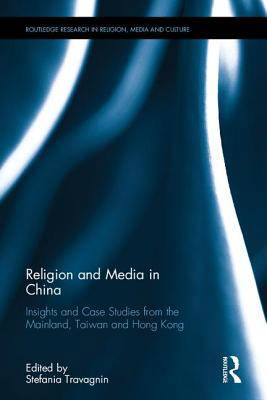
- Afhalen na 1 uur in een winkel met voorraad
- Gratis thuislevering in België vanaf € 30
- Ruim aanbod met 7 miljoen producten
- Afhalen na 1 uur in een winkel met voorraad
- Gratis thuislevering in België vanaf € 30
- Ruim aanbod met 7 miljoen producten
Religion and Media in China
Insights and Case Studies from the Mainland, Taiwan and Hong Kong
Omschrijving
This volume focuses on the intersection of religion and media in China, bringing interdisciplinary approaches to bear on the role of religion in the lives of individuals and greater shifts within Chinese society in an increasingly media-saturated environment. With case studies focusing on Mainland China (including Tibet), Hong Kong and Taiwan, as well as diasporic Chinese communities outside Asia, contributors consider topics including the historical and ideological roots of media representations of religion, expressions of religious faith online and in social media, state intervention (through both censorship and propaganda), religious institutions' and communities' use of various forms of media, and the role of the media in relations between online/offline and local/diaspora communities. Chapters engage with the major religious traditions practiced in contemporary China, namely Buddhism, Daoism, Confucianism, Christianity, Islam, and new religious movements.
Religion and the Media in China serves as a critical survey of case studies and suggests theoretical and methodological tools for a thorough and systematic study of religion in modern China. Contributors to the volume include historians of religion, sinologists, sociologists, political scientists, anthropologists, and media and communication scholars. The critical theories that contributors develop around key concepts in religion--such as authority, community, church, ethics, pilgrimage, ritual, text, and practice--contribute to advancing the emerging field of religion and media studies.
Specificaties
Betrokkenen
- Uitgeverij:
Inhoud
- Aantal bladzijden:
- 304
- Taal:
- Engels
- Reeks:
Eigenschappen
- Productcode (EAN):
- 9781138849396
- Verschijningsdatum:
- 30/11/2016
- Uitvoering:
- Hardcover
- Formaat:
- Genaaid
- Afmetingen:
- 157 mm x 231 mm
- Gewicht:
- 566 g

Alleen bij Standaard Boekhandel
Beoordelingen
We publiceren alleen reviews die voldoen aan de voorwaarden voor reviews. Bekijk onze voorwaarden voor reviews.










